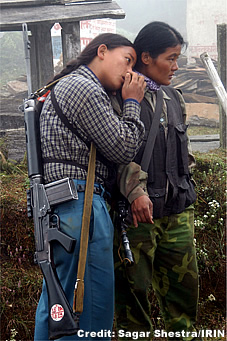|
Facts
on the Conflict: Peace Process
|
|
Final
agreement on management of combatants and weapons
|
 |
KATHMANDU,
29 November 2006 (IRIN)
Maoist
rebels and Nepal's interim government signed a formal agreement on the
management of both sides' arms and weapons on Tuesday night.
 |
| "We
have been successful in reaching an agreement on a very crucial issue of
our peace agreement," said home minister and key government negotiator
Krishna Prasad Sitaula following the signing.
The
agreement came nearly three weeks after the main peace pact was inked between
the rebels and government ending a decade-long armed conflict in which
an estimated 14,000 Nepalese died.
"This
agreement will lead towards a lasting political situation," said Krishna
Mahara, rebel spokesperson and negotiator.
The
key provisions of the "Agreement on Monitoring the Management of Arms and
Armies" include the cantonment of Maoist soldiers and their weapons at
designated sites. The government will also confine its soldiers to barracks
and they will be used only for providing security for prominent officials,
and for patrolling national parks, borders, banks, airports and power generation
sites.
United
Nations monitoring team members will have unlimited access throughout the
process to monitor both Maoist cantonment camps and army barracks to ensure
the agreement is being implemented. |
|
The
agreement also holds both sides accountable for identifying and assisting
child soldiers and support staff. The rebels have thousands of children
working for them, according to NGOs working for children's rights.
Important
for civilians caught up in the conflict, both armies will also cooperate
in identifying landmines and booby traps - still a major threat to the
lives of many people in rural areas. All landmines and booby traps have
to be dealt with in two months, although experts suggest making the country
mine-free could take many years and significant resources.
Rebel
officers and soldiers are due to be integrated into a new national security
force at some point in the future. Their eligibility will be decided by
a special committee formed from a new interim council of ministers to be
created in December.
The
Joint Monitoring Coordination Committee (JMCC) composed of the UN, the
government and Maoists will be the main coordinating body for monitoring
arms and armies, Sitaula said.
top
Credit
IRIN 2006
Copyright
© UN Office for the Coordination of Humanitarian Affairs 2006
[
This report does not necessarily reflect the views of the United Nations]
Integrated
Regional Information Networks (IRIN), part of the UN Office for the Coordination
of Humanitarian Affairs (OCHA).
top

|




